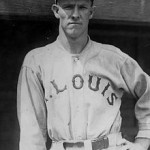Austin Bush McHenry was born on September 22, 1895, in Wrightsville, Ohio, to Oscar and Hannah (Jones) McHenry. He was the older of two children, preceding his sister Alice by two years. He grew up in Jefferson Township in Adams County and played baseball through high school, but it wasn’t until 1914 when he came under the tutelage of scout Billy Doyle, who ran a baseball school for young players in Ohio, that he really began to show off his abilities. McHenry started out as a second baseman but was shifted to the outfield where he found immediate success.
First Pro Contract
He signed that first professional contract with Portsmouth of the Class D Ohio State League in 1915 at the age of 19 and helped lead the Cobblers to a pennant. McHenry was gifted but raw, and according to the local newspaper, “…was not on speaking terms with the finer points of the national game.” But what he lacked in knowledge he made up for with hustle, eagerness, enthusiasm, and a determination to succeed. Soon he was drawing comparisons to Ed Delahanty and Ty Cobb and was said to have “an arm of steel.” And he could flat out hit, prompting the Portsmouth Daily Times to call him a “veritable demon at the bat” and insist, “…his batting was a feature of almost every game.” But he had plenty of help from a roster that included eight players with previous or subsequent major league experience, an amazing total for a Class D team in the Deadball Era.
Teammate Dies Early
One of those men, catcher Pickles Dillhoefer, would eventually become McHenry’s teammate on the St. Louis Cardinals, and two of them, Dillhoefer and Ralph Sharman, would also die prematurely. Another player from that team, Alex “Red” McColl, didn’t make his major league debut until 1933.
Successful Season
McHenry’s first season as a pro was a successful one as he batted .297 and slugged .421, and finished second on the team in home runs with four. He began the 1916 season with Portsmouth but was sold to the American Association’s Milwaukee Brewers in July for $300 when the Ohio State League disbanded. McHenry spent the rest of the season with the Brewers but struggled, hitting only .240 and slugging .326 in 72 games. He was also the victim of a beaning that seemed fairly innocuous at the time, especially since he was able to continue playing after a short rest, but would later be blamed for the tumor that eventually took his life. McHenry was farmed out to Peoria of the Central League in the spring of 1917 and batted .270 with two homers in 22 games, before being recalled to Milwaukee, where he batted .235 with four homers in 102 games.
At first glance it looked like McHenry had another poor season, but only two of his teammates had as many homers, and they had the benefit of 500-at-bat seasons, whereas McHenry recorded only 373 at-bats for the Brewers. In terms of at-bats per home run only Johnny Beall had a better season than McHenry, who was becoming one of the better home run hitters in the high minors. The Cincinnati Reds were clearly impressed and purchased his contract after the 1917 season for $2,500. But after he suffered a broken nose during a spring training game in 1918, he was returned to Milwaukee on March 2
Comparable to Taveras
One of the top prospects in all of baseball was St. Louis Cardinals outfielder Austin McHenry. In 1921 he batted .350 and had a slugging at .531 and was second on the team in those categories to Rogers Hornsby. Also he was in the top five in the league in doubles, total bases, RBI’s and extra base hits. Combined with a strong arm and an easy gait that was sometimes mistaken for indifference, McHenry was considered not only one of baseball’s best outfielders and hitters after his remarkable 1921 campaign, but one of the ten best left fielders of all time to that point in baseball history.
Brain Tumor Ends Baseball Career
Then things turned in 1922 as he was having issues at the plate and in the field that was caused by problems of vision. He feared he was going blind and talked to Cardinals manager Branch Rickey about it.
Rickey sent him home to rest. McHenry went to the doctor and he was diagnosed with a brain tumor. Four months later, the top prospect dies from brain tumor.

